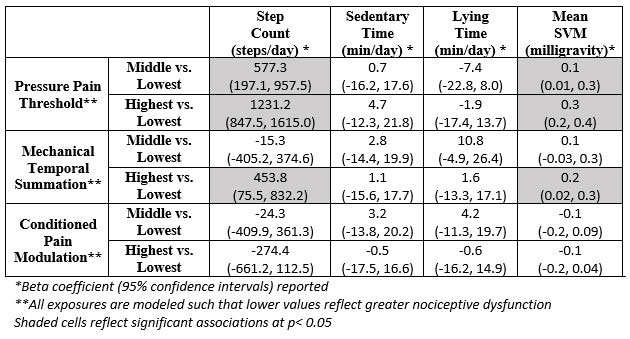Session Information
Session Type: Poster Session D
Session Time: 1:00PM-3:00PM
Background/Purpose: Individuals with chronic pain due to knee osteoarthritis (OA) are insufficiently physically active and increasing physical activity is the first line recommendation for management of chronic pain due to knee OA. People with knee OA can also have increased peripheral and/or central pain sensitization (i.e., ascending facilitatory dysfunction) and/or inefficient descending pain inhibition. Whether altered facilitatory and inhibitory nociceptive functioning is related to lower physical activity in people with knee OA is not known. Our objective was to examine the association of nociceptive dysfunction with objective accelerometer-based measures of physical activity in a large observational cohort of knee OA.
Methods: We used data from the Multicenter Osteoarthritis Study (MOST), a longitudinal cohort study of individuals with and without knee OA. Measures of nociceptive functioning served as exposures and included pressure pain threshold (PPT) at the knee, mechanical temporal summation (TS) at the wrist, and conditioned pain modulation (CPM) using the forearm ischemia test. Lower PPT is reflective of increased peripheral or central pain sensitivity. Greater mechanical TS is reflective of increased central pain sensitivity. Lower CPM reflects inefficient descending pain modulation. Physical activity was assessed over 7-days using a lower back worn activity monitor. Summary metrics included steps/day, sedentary time, lying time, and mean 3D signal vector magnitude (SVM, reflects activity intensity). We evaluated the relation of pain sensitivity measures per standard deviation unit as tertiles (lower tertile as reference) to the physical activity measures using linear regression while adjusting for age, sex, race, body mass index (BMI), education, and presence of radiographic knee OA. The exposures were modeled such that lower values reflect greater nociceptive dysfunction. We did not adjust for pain because we hypothesized that pain was on the causal pathway between our exposure and outcomes.
Results: We included 1,951 participants (age = 62.7 ± 10.1 years, BMI = 28.9 ± 5.5 kg/m2, 56.3% female; 41% with radiographic OA in at least one knee) with full data available for analysis. Compared with the lowest tertile of PPT, those in the middle and highest tertiles of PPT had higher step count and SVM (Table 1). Similar results were seen when comparing people in highest tertile of TS with lowest tertile. CPM was not significantly related to any of the physical activity measures and none of the exposures were significantly related to sedentary time or lying time.
Conclusion: In this cohort, heightened ascending facilitatory nociceptive processing, such as reduced PPT or higher TS, was related to reduced levels of objectively-assessed walking activity and lower activity intensity. Inhibitory nociceptive functioning measured as CPM was not related to physical activity. None of the nociceptive measures were related to inactivity (i.e., sedentary time, lying time). Developing means of addressing pain sensitization in people with knee OA may be a necessary early step to aid individual’s ability to engage in physical activity.
To cite this abstract in AMA style:
Kumar D, Wang N, Torabian K, Aoyagi K, Stefanik J, Frey-Law L, Carlesso L, Hausdorff J, Gazit E, Segal N, Lewis C, Nevitt M, Neogi T. Associations of Nociceptive Dysfunction with Physical Activity in Knee Osteoarthritis: The Multicenter Osteoarthritis Study [abstract]. Arthritis Rheumatol. 2022; 74 (suppl 9). https://acrabstracts.org/abstract/associations-of-nociceptive-dysfunction-with-physical-activity-in-knee-osteoarthritis-the-multicenter-osteoarthritis-study/. Accessed .« Back to ACR Convergence 2022
ACR Meeting Abstracts - https://acrabstracts.org/abstract/associations-of-nociceptive-dysfunction-with-physical-activity-in-knee-osteoarthritis-the-multicenter-osteoarthritis-study/

